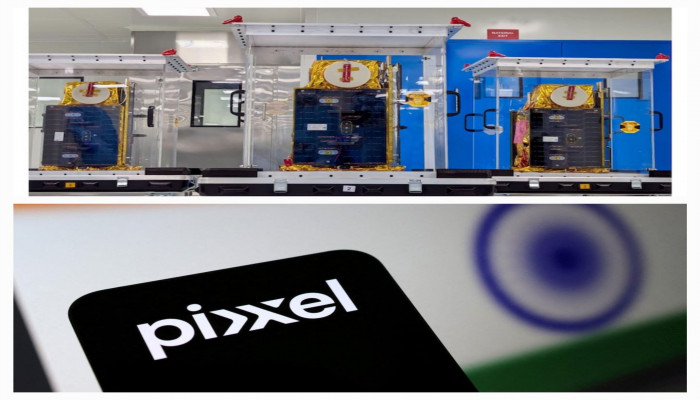Indian startup Pixxel launches high-resolution commercial hyperspectral satellites
- In Reports
- 05:00 PM, Jan 15, 2025
- Myind Staff
Indian space-tech company, Bengaluru-based startup Pixxel, announced on 15 January, Wednesday the launch of three of the world's highest-resolution commercial hyperspectral satellites from California’s Vandenberg Space Force. The company is backed by Google. The Firefly constellation satellites were assembled by Exolaunch and launched on the Transporter-12 rideshare mission with SpaceX. The launch occurred around 1 am.
Pixxel hosted a live screening of the launch at its headquarters in Bengaluru. Pixxel's founder and CEO, Awais Ahmed, stated that launching the first three satellites will enable the organisation to provide more precise critical climate and Earth information.
Ahmed was speaking to reporters during the screening. He said that the Firefly constellation was six times finer than the 30-metre standard used by most hyperspectral satellites, catching fine details previously imperceptible to conventional setups. He added that Firefly ticks a watershed moment in India's space journey as the country's first commercial satellite constellation.
Ahmed said it is possible to capture previously invisible fine details for the first time, with a resolution of five metres, adding that Pixxel already has more than 60 clients, including NASA, the US and Australian governments. This advanced technology resolution is coupled with the capability to capture data across more than 150 spectral bands, allowing Firefly satellites to detect chemical composition, plant health, water quality, and even subtle changes in atmospheric conditions with unparalleled accuracy, said Kshitij Khandelwal, Pixxel's founder and CTO.
As per Khandelwal, while conventional Earth observation satellites depend on wider spectral bands, Firefly's narrowband sensors reveal hidden patterns and anomalies important for applications ranging from agriculture to climate action.
"And yet, for us to sell the data to the Indian government, we still need to sort out a few things. One of the funny problems we came across is that because we are the only company providing hyperspectral data in India, they cannot procure from us because they need at least two bidders," said Ahmed, CEO of Pixxel. Even if the launch is booming and all possibilities are explored, many things can go wrong in the next few days, said CTO Khandelwal.
"Around 6-7 am today (Wednesday), we will start communicating with the satellite, hopefully. Once that happens, we will start commissioning different parts of the spacecraft, which will take about a week or so. After that, we will start operating the camera. Slowly, steadily, we will take the images of known sites to calibrate the exposures of the cameras," he said.
This entire process will take one month or more. Ahmed said that Pixxel intends to undertake three more Firefly satellites in March. He mentioned that Pixxel's journey started with the launch of India's first private Earth-imaging hyperspectral satellite, Shakuntala, in April 2022.
"The future of our planet depends on how deeply we understand it today. The successful deployment of our first commercial satellites is a defining moment for Pixxel and a giant leap toward redefining how we use space technology to address the planet's challenges," he said.







Comments